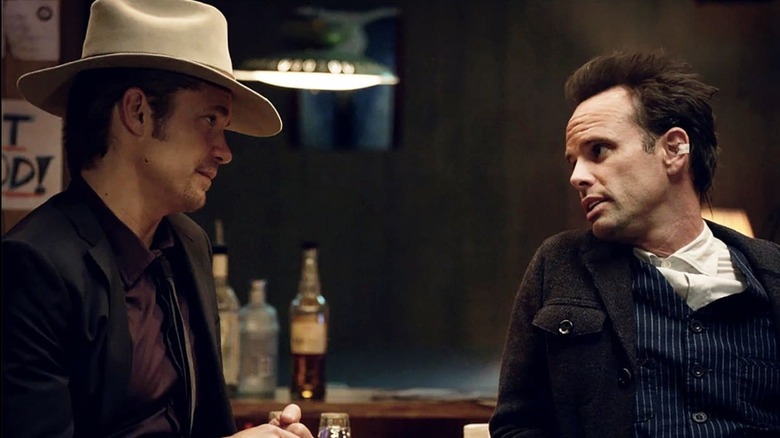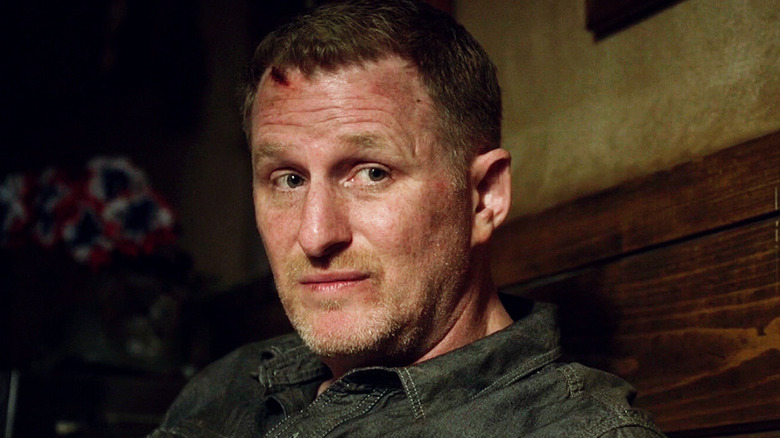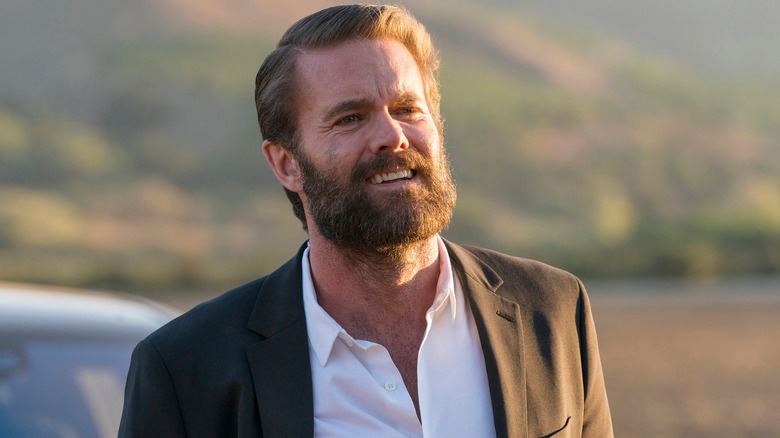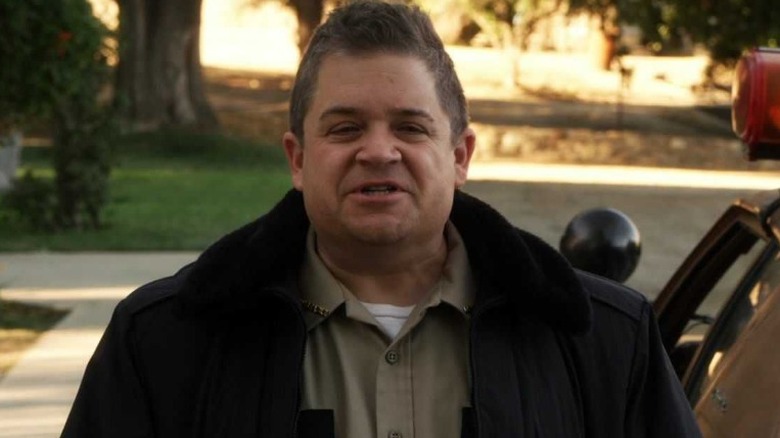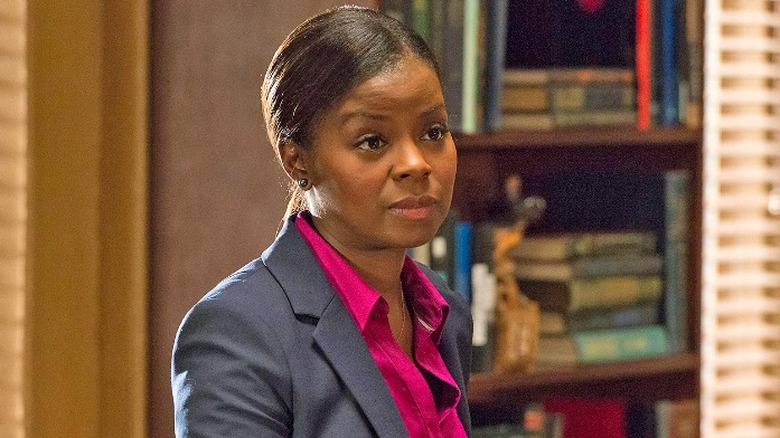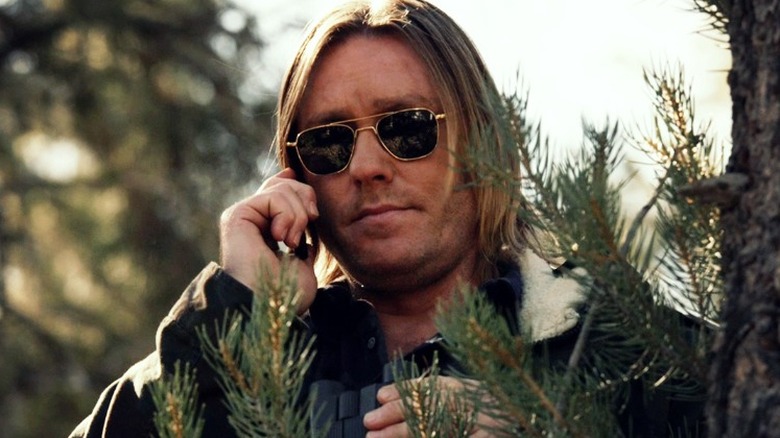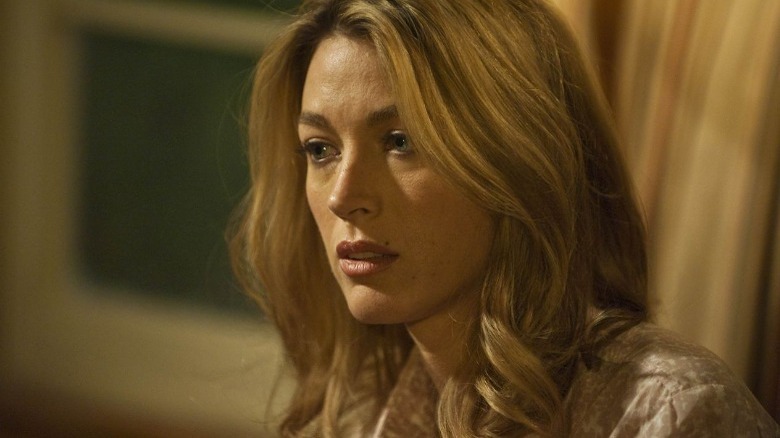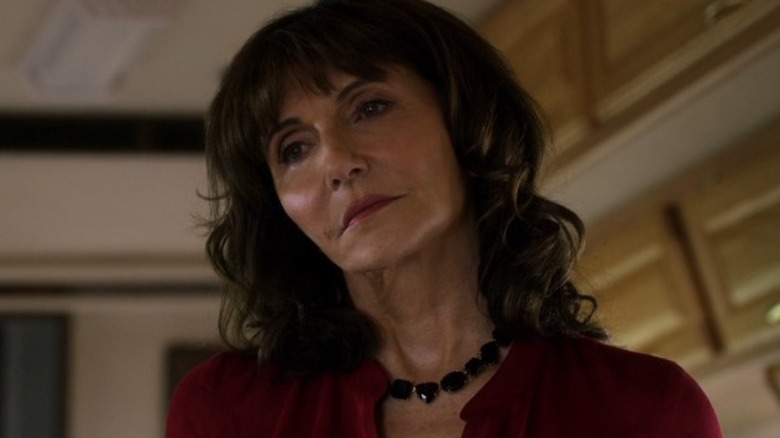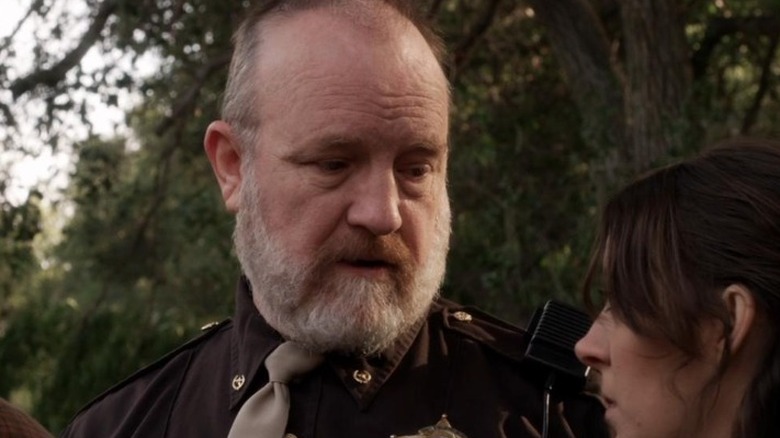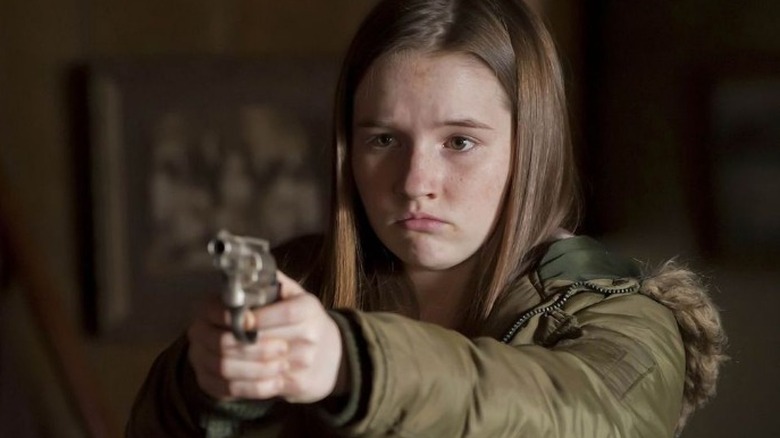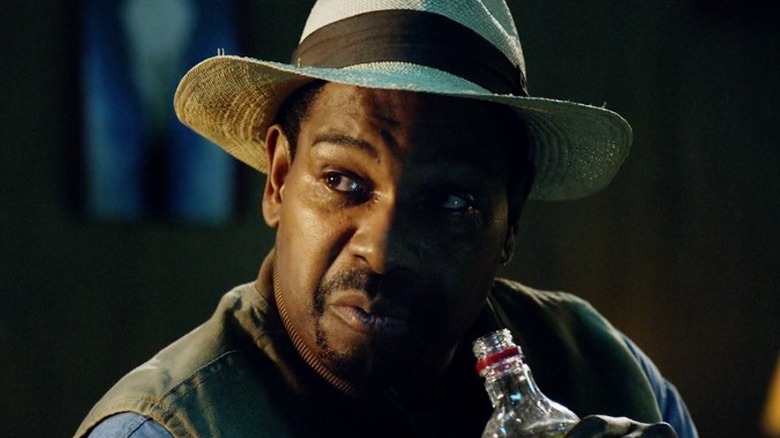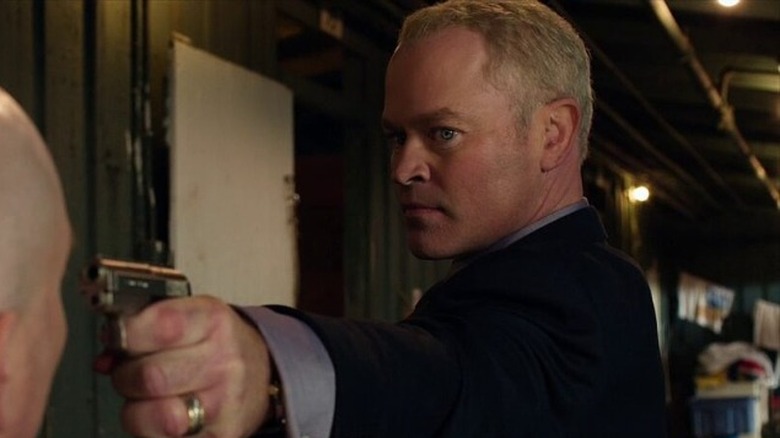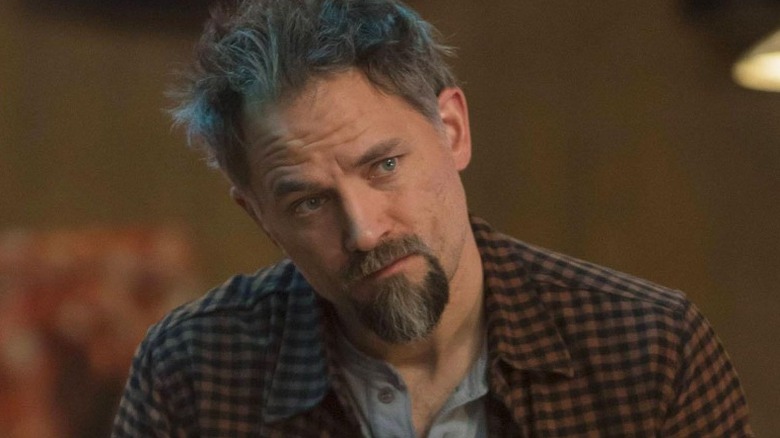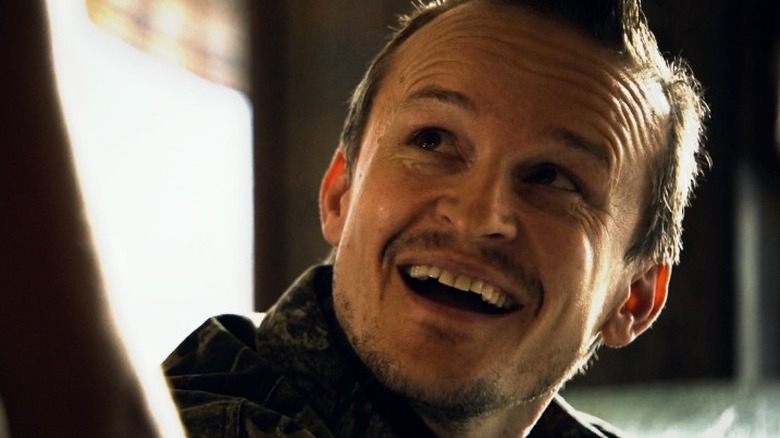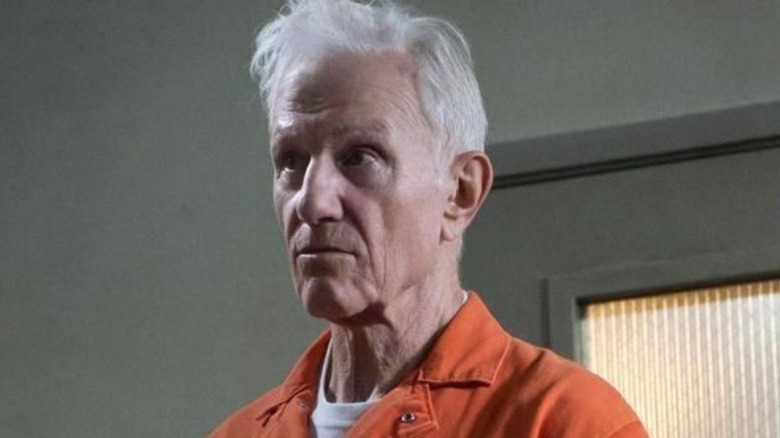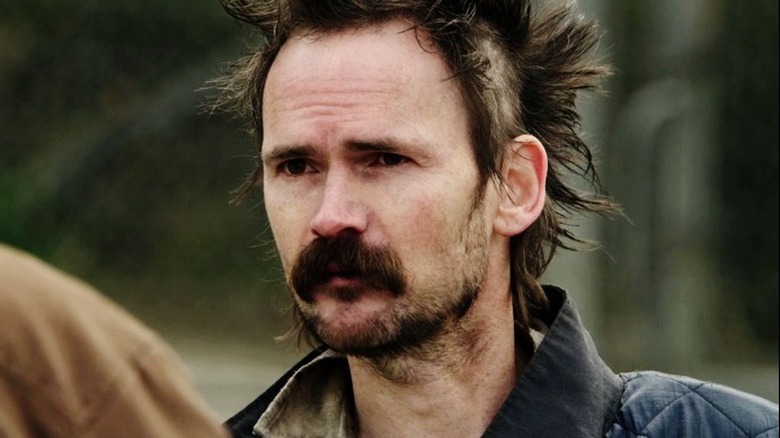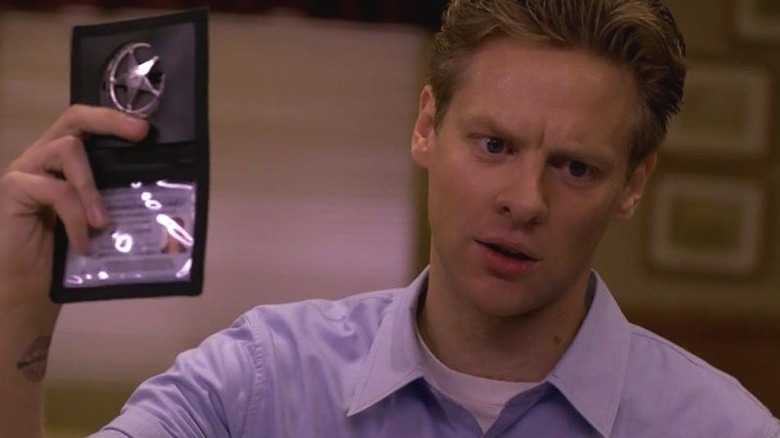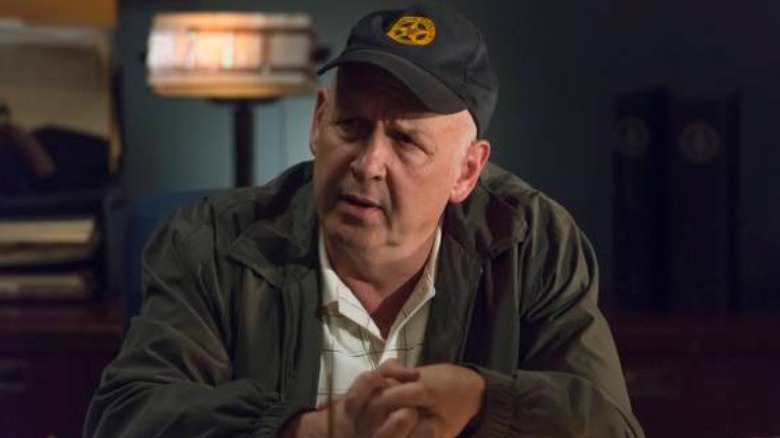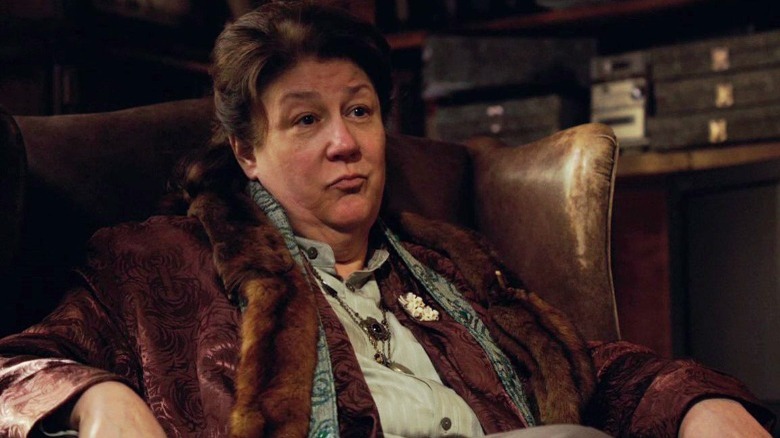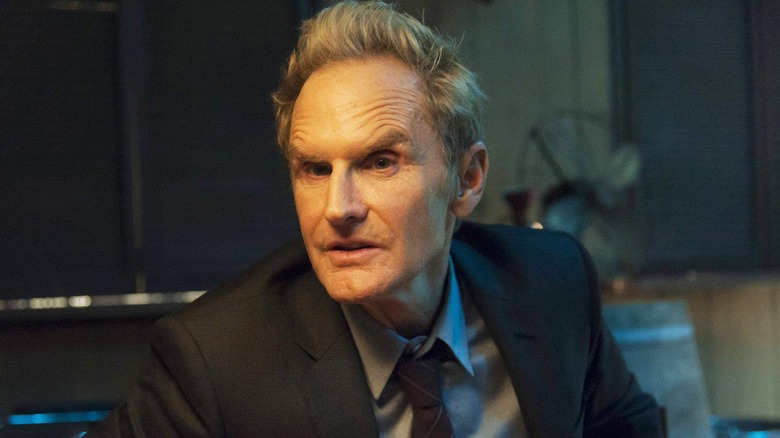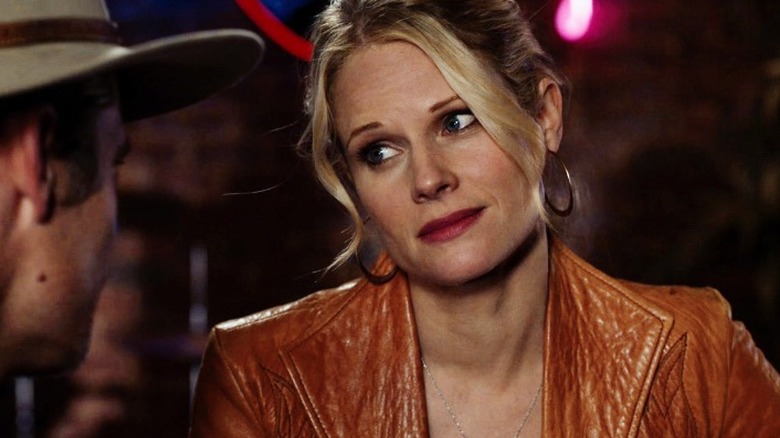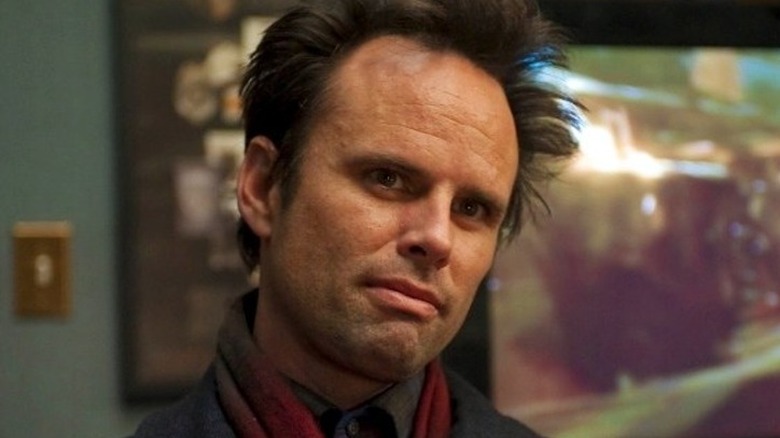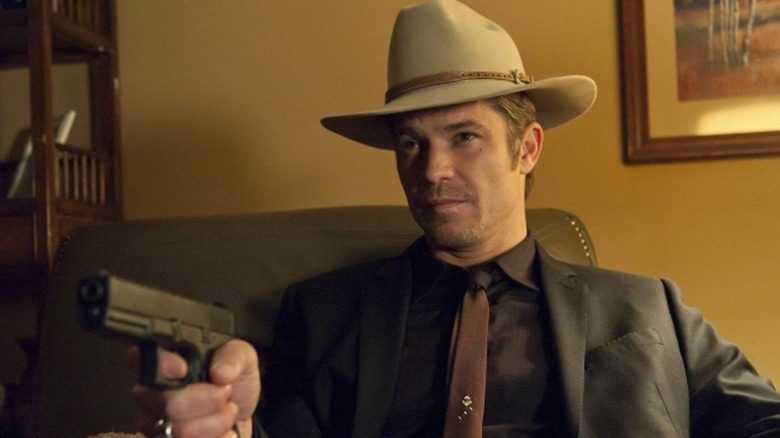The 22 Best Characters In Justified Ranked
"Justified" is potentially the most unfairly neglected TV drama of all time. It was always critically acclaimed with a dedicated fanbase, but it had the misfortune of airing during the same time as "Breaking Bad" — there was no competing with that! As such, it remains a hidden gem of television, a modern-day western following deputy marshal Raylan Givens (Timothy Olyphant) as he is reassigned from Miami to his hometown of Harlan, Kentucky, where he faces numerous ghosts from his past.
Possibly the best adaptation of any Elmore Leonard material (at least as good as "Out of Sight", "Jackie Brown," and "Get Shorty"), with playful dialogue and some truly great performances, "Justified" perfectly captures Leonard's distinct style and cadence. Even more impressive is the fact the show's entire premise is built from one short story, with showrunner Graham Yost and his team of writers keeping the quality mostly consistent throughout. Unlike much prestige television, "Justified" is incredibly fun, and as such remains eminently rewatchable, with some of the most colorful, idiosyncratic characters ever seen on television. A revival of "Justified," titled "Justified: City Primeval," was announced in January 2022. Now is as good a time as any to take a look at the 22 best characters from the original series.
22. Daryl Crowe Jr.
In a show full of dysfunctional criminal families, the Crowes stand out as the worst of the bunch, and Daryl Crowe Jr. might be the most repellent villain of the entire series. The head of the family, Daryl is a hypocritical, self-serving bully who spouts rhetoric about sticking by his family while throwing them under the bus to save his own skin. Michael Rapaport drew derision for his shaky accent, but he makes Daryl a physically imposing and consistently entertaining antagonist, who holds his own against the charismatic Boyd. His rough, scruffy exterior belies his ruthless cunning. He is one slippery character, using a combination of wiles and his lawyer sister, Wendy (Alicia Witt), to insulate himself from the legal ramifications of his criminal activities.
He also has an innate ability to manipulate his family and turn any situation to his advantage, including intimidating Dewey when he learns of his cousin's windfall, and wrapping Wendy around his little finger. This backfires fatally, however, after he coerces his nephew into taking the rap for a shooting Daryl himself committed, a move that turns Wendy against him for good.
21. Ty Walker
Season 6 of "Justified" introduced a plethora of new villains, from the ruthless Avery Markham (Sam Elliott) to Ava's mad uncle Zachariah Walker (Jeff Fahey). It sometimes felt like the writers didn't know what to do with them all. Perhaps the most glaring victim was Garret Dillahunt's former soldier Ty Walker, who serves as Markham's right-hand man for the first half of the season. What makes Walker stand out from the huge cast of moronic villains the show had accumulated by this point is his sheer competence.
When Markham turns on him, Walker does everything possible to survive and nearly gets away. The sight of him fishing a bullet out of his shoulder in a service station makes it impossible for us not to sympathize with him, but any goodwill dissipates when he coldly guns down a couple of paramedics trying to cash in on the reward for his capture. When one begs for mercy, telling Walker he can just tie him up, Walker replies, "Yeah, I could do that ... but it's been such a day," and guns him down. Dillahunt didn't stay long on "Justified," but he made the most of his limited screen time, creating a genuinely menacing, eerily cool-headed villain. You can't help but wish he'd stuck around a bit longer.
20. Constable Bob Sweeney
A longtime fan of the show himself, Patton Oswalt was a surprise addition to the "Justified" cast. When Constable Bob was introduced, you could be forgiven for thinking that the showrunners had jumped the shark and introduced a purely comic relief character, something especially redundant in a series like this where pretty much everyone gets witty dialogue. Thankfully Oswalt's winning, vulnerable performance prevents him from being purely a joke.
A high school classmate of Raylan, Bob is constantly trying to prove himself to the marshal. Whether he's challenging criminals to quick draw contests or dropping lines like, "I got a badge and balls like Death Stars," Bob is one of the most endearing characters in the series. The culmination of his arc in Season 4 firmly grounds his character in reality, as well as providing one of the show's most cathartic scenes. Captured by the Dixie Mafia and tortured for information, he proves his mettle and then some, withstanding a brutal beating and overpowering his captor. As Raylan puts it: "People underestimate Bob at their peril."
19. Rachel Brooks
Truth be told, Erica Tazel was a little ill-served by "Justified." While Tim got to crack wise and act as Raylan's backup on multiple occasions, Rachel is the character who takes her job seriously. She's always the adult in the room when paired up with Raylan or Tim, and is easily the most professional in the Harlan Marshal's Office. Unfortunately, that doesn't always translate into a dynamic character.
The few times where she is the focal point of the story though, Tazel shines. In the episode where she hunts down the man responsible for her sister's death, we get an insight into her personal life in a moving storyline that we wish had been explored in more depth. Named by Art as his successor in the Marshal's Office, in the final episode we learn that she's been promoted and transferred; so at the very least, her career hasn't been wrecked by her association with Raylan.
18. Colton Rhodes
Boyd had his share of henchmen over the course of the series, but they tended to suffer from incompetence, disloyalty, or simply not being that memorable. Colton Rhodes, Boyd's PTSD suffering army buddy, is the exception. Of course, he still messes up big time, singularly failing to murder Ellen May and relapsing into his heroin addiction. But he's a riveting character, with more expertise and personality than most of Boyd's crew. He also serves as a negative reflection of Tim Gutterson (Jacob Pitts), a relationship that pays off in one of the series' best episodes, as the two use their shared experiences in military tactics to outwit each other.
You get the sense that the war has rid Rhodes of much of his humanity, leading to him casually killing for Boyd without a second thought. Nonetheless, Ron Eldard's performance brings a level of melancholy to the role, along with a wry sense of humor, that makes him a compelling character regardless.
If you or someone you know is struggling with mental health, please contact the Crisis Text Line by texting HOME to 741741, call the National Alliance on Mental Illness helpline at 1-800-950-NAMI (6264), or visit the National Institute of Mental Health website.
If you or anyone you know is struggling with addiction issues, help is available. Visit the Substance Abuse and Mental Health Services Administration website or contact SAMHSA's National Helpline at 1-800-662-HELP (4357).
17. Winona Hawkins
Raylan's ex-wife has a bit of a thankless role, effectively serving as a sensible foil for all the hijinks that Raylan gets up to. Nonetheless, she provides a much-needed voice of sanity amidst the gunplay and banter. While Raylan has several romantic entanglements throughout the series, he never finds anyone who understands him as well as Winona, and she isn't afraid to call him out on his behavior. Without Winona we'd think of Raylan as a standard renegade lawman; with her we see how damaging his actions can be.
It helps that Natalie Zea and Timothy Olyphant have such great chemistry, making us root for them as a couple through the entire series. For a supposedly grounded character, though, she can be indecisive and often acts erratically (see the moment she impulsively steals money from an evidence locker, relying on Raylan to put it back). She is still cool under pressure, though, as seen in the scene where hoods threaten their daughter and she and Raylan leap into action together. Also, it's difficult to completely dislike a character whose response to being asked if they moved an incriminating piece of evidence is, "What am I, an a**hole?"
16. Katherine Hale
The final season of was rich with antagonists, such as the ostensible big bad, Avery Markham, Walker and his veterans, and the quick draw artist Boon (Jonathan Tucker). And then there was Boyd, who by this point had fully embraced his villainous nature. Markham's lover, Katherine Hale, was a very different kind of villain. Introduced in Season 5 as a sort of criminal consultant — for a substantial fee, of course — her true agenda is revealed in the final season: she plans on robbing and killing Markham, who she believed ratted out her deceased husband.
The reason Markham never felt like a truly threatening presence in the show is that we know that he is being outwitted by his lover throughout, and Mary Steenburgen makes Katherine such an ice-cold character that he can never quite measure up. She's an unforgiving presence on the show, deploying her disarming smile and silky soft voice to devastating effect. Markham is an intimidating villain, but he's sheer brute force, with all the subtlety of a shotgun. Katherine is just as deadly, but more like a stiletto that slides in between your ribs before you realize what's happening.
15. Sheriff Shelby Parlow
Another "Deadwood" alum (along with Timothy Olyphant, Garret Dillahunt, and many more), Jim Beaver brings his usual brand of grizzled decency to the role of Shelby Parlow. The mild-mannered security guard at the Black Hills coal mine ends up running for sheriff of Harlan County and winning the election — with a little help from Boyd.
While dismissed as weak-willed and corrupt by pretty much everyone, he's shown to be increasingly uncomfortable under Boyd's thumb and eventually works against him by actively protecting Ellen May. The sheriff also takes an active interest in detective work, assisting Raylan in the hunt for the mysterious Drew Thompson. Shelby is one of the best instances in the show of a seemingly minor character taking on a life of their own. After hanging around for two seasons, he is shown to be a layered character with a colorful past, and greater links with Harlan's past than even Raylan realized.
14. Loretta McCready
One of Raylan's few genuine blind spots, 14-year-old Loretta McCready is orphaned in her first appearance in Season 2 after her father is murdered by the Bennetts. Taken under the wing of Mags Bennett (Margo Martindale) and treated as a surrogate daughter, she might be a strong-willed character and a canny operator in her own right, but she is still a child, and Raylan casts a protective eye on her that lasts throughout the series. Loretta learns quickly from those around her, and by the end of the series, she has matured into Harlan's youngest drug lord.
Level-headed and imbued with a shrewd entrepreneurial spirit, she boldly faces down threats from the likes of Hot Rod Dunham and Avery Markham. She also has her own ruthless streak; she knows exactly how to manipulate Raylan and leads on the guileless Derek, indirectly getting him killed. Kaitlyn Dever is impressive from her very first appearance and only gets better as the series goes on. Her final showdown with Mags is incredibly powerful, and Dever's delivery of, "I want my daddy here to tell me!" is simply heartbreaking. Dever makes the unlikely characterization of Loretta plausible and holds her own against the more seasoned actors she shares scenes with.
If you or anyone you know is struggling with addiction issues, help is available. Visit the Substance Abuse and Mental Health Services Administration website or contact SAMHSA's National Helpline at 1-800-662-HELP (4357).
13. Ellstin Limehouse
Not quite a villain, but equally not a good guy, the boss of Noble's Holler is an imposing, fairly enigmatic character in the series, ruling his community with an iron fist. Ostensibly a banker for the criminal underworld of Harlan, he looks after their ill-gotten gains, as well as trading in information, and provides shelter to vulnerable women — or, at least, those who can afford it.
Mykelti Williamson plays the hell out of this character, making him alternately sinister and honorable. He gets one of the most menacing introductions of the show, threatening to pour lye on the hand of a subordinate for falling asleep on the job. He is loyal to nobody except his own people, and clearly enjoys toying with the other criminal elements, as well as Raylan. Despite this, he remains one of the few comparatively honorable characters in the series, respecting the wishes of Mags Bennett, and providing Ellen May with much-needed sanctuary, even as he flaunts his knowledge of Boyd's illicit activities to his face.
12. Robert Quarles
One of the most memorable big bads of the entire series, Neal McDonough makes Robert Quarles a uniquely disarming character, with bright blue eyes and an unnerving grin. Arriving on the scene as just about the slickest, most professional villain the show had ever seen, he quickly dispatches the inefficient gangsters in charge with his signature weapon, a "Taxi Driver" inspired gun up his sleeve.
Cut off by the Dixie Mafia, Quarles' plan for an OxyContin clinic is his big swing to get back in the good books of crime boss Theo Tonin (Adam Arkin). He's a truly terrifying character, genially talking to his son on the phone while preparing to torture a semi-naked man tied to a bed in a back room of his house. We never see what he does to his victim, but we hear the screams, and his behavior is enough to terrify the unflappable killer Wynn Duffy. Like many "Justified" villains, Quarles gets even more scary and unpredictable when his plans are derailed by the separate efforts of Raylan and Boyd, and he quickly spirals out of control. He transforms into a pill-popping, unhinged psychopath, and embarks on a personal vendetta against the marshal.
If you or anyone you know is struggling with addiction issues, help is available. Visit the Substance Abuse and Mental Health Services Administration website or contact SAMHSA's National Helpline at 1-800-662-HELP (4357).
11. Johnny Crowder
Cousin Johnny might not have the vocabulary or quite the same level of suave cunning as Boyd, but he's still a Crowder, with the wild hair and scheming nature that go along with the name. Cut in half with a shotgun at the end of Season 1 as a result of Boyd's plotting, Johnny is revealed to have survived, albeit stuck in a wheelchair. He rejoins his cousin, but continues to nurse a bitter grudge against Boyd, and secretly works against him for the remainder of the series.
It remains one of the biggest shames of the series that David Meunier wasn't fully available during Season 5, where he could easily have been the season's primary antagonist. As it is, he ended up being one of many loose ends that needed tying up before the final season. He became more a thorn in Boyd's side than a villain in his own right, although he still manages to land a few blows against Boyd's empire along the way. Ultimately, Johnny is too smart to be a lackey, but nowhere near charismatic enough to take over from Boyd. As Boyd puts it himself: "Some men lead and some men follow, and when you can't lead and you refuse to follow, you die alone in the desert."
10. Dewey Crowe
A gator poaching neo-Nazi who constantly talks about himself in the third person ("The third person? You mean this guy?"), Dewey is a career criminal who is uniquely ill-equipped for a life of crime. He's a fool, to put it plainly, and could be dismissed as just a joke character if it wasn't for the pathos that Damon Herriman brings to the role.
Introduced in the pilot, and lasting all the way through to the final season, Dewey was a constant pain in the neck to both Raylan and Boyd, blowing crucial moments for both of them by being his idiotic self. Spewing aphorisms left, right, and center, Dewey is just the right side of incompetent to be an endearing character. He's easily the most likable villain on the show, right up until he is intimidated into killing his best friend. In his lowest moment, he is coerced into committing a crime spree after being led to believe that he's had his kidneys removed. When it's revealed that he still has both of them, he exclaims, "You mean I had 4 kidneys?"
9. Arlo Givens
Raylan's father gets such a big build-up in the show that when we finally meet him you could be forgiven for feeling a little letdown. A slight, gray-haired petty criminal, he nonetheless casts a looming shadow over the series and Raylan in particular. Actor Raymond J. Barry described Arlo as "pleasantly unpleasant," and that's just a perfect description of the character. He's charming to strangers but a monstrous father to Raylan, and in many ways, it's this relationship that defines Raylan's character.
Arlo's irascible relationship with Raylan's aunt Helen (Linda Gehringer) is his character's one redeeming feature, as evidenced when he quickly goes off the rails after her death. He's still a formidable character though, as demonstrated in the scene where he attacks the men who assaulted Helen with a baseball bat, or when beating up his attackers during an attempted murder in a prison barbershop. A lesser show might have featured some final reconciliation between Arlo and Raylan, but "Justified" wisely steers clear of this and never softens his character. His final words to his son? "Kiss my a**."
8. Dickie Bennett
In a series full of duplicitous villains, Dickie Bennett might just be the most weaselly of them all. Jeremy Davies' performance style can be an acquired taste, full of awkward tics and twitches, but it's entirely fitting here. The most enterprising of Mags' offspring, Dickie is a sinister presence, and as the season goes on, he is shown to be both cruel and cowardly. He presents an unlikely but credible threat to both Raylan and Boyd throughout the season, ruthlessly killing without hesitation, and even managing to get the upper hand on Raylan with a baseball bat.
Bearing a bitter grudge against Raylan for breaking his leg when they were in high school, their relationship is a combination of loathing and a weird kind of affection, as shown in their final scene together. They clearly hate each other, but there is an undeniable connection that exists between them — Raylan can barely suppress a smile at Dickie's final joke. Dickie is an abhorrent, pathetic character, with just about the goofiest haircut on television, but he's almost redeemed through his child-like friendship with Dewey Crowe. The glee on his face when Dewey visits him in prison makes it impossible to hate him entirely.
7. Tim Gutterson
Apart from Art, Raylan's colleagues in the Marshals Service were rather under-utilized across the series, and former army sniper Tim Gutterson is no exception. The key difference between the characterization of him and Rachel, though, is that Tim gets a lot more cool lines, and is often sent out to rein Raylan in or clear up his mess. Jacob Pitts quickly became a fan favorite thanks to his unflappable demeanor and perfect dry delivery of some of the series' funniest lines. As with Rachel, we don't get much insight into his personal life, just that he's incredibly good at his job, efficient, and a dead shot. You get the sense that Tim has only started acting out since Raylan arrives in town, and the dynamic between them often feels like two brothers, constantly getting on each other's nerves.
While he suffers from a lack of development, Tim does at least get some incredibly badass moments. He also gets a neat story arc in Season 4, in the form of his rivalry with Colton Rhodes. The two have an interesting relationship, adversaries with a shared history that bonds them together despite being on opposite sides of the law, in a similar way to Boyd and Raylan.
6. Art Mullen
Nick Searcy's grouchy but good-natured performance makes Art one of the most likable characters on the show. He's a mentor and father figure to Raylan, whose exasperation is initially played for laughs before giving way to some serious drama as he realizes the self-destructive path Raylan is intent on going down. While he gets some of the most memorable bits of dialogue — much of which was improvised by the actor — what Searcy absolutely nails is the sense in disappointment Art feels towards Raylan as a lawman, combined with the paternal instinct he feels despite himself.
What's frustrating is that we as an audience know that Raylan isn't dirty; Art doesn't and his disappointment over Raylan's actions is more devastating than anything his actual father could say to him. While he's unfailingly moral, he can never bring himself to formally reprimand Raylan, but this leniency leads to the two falling out irrevocably in the fallout from the death of Nicky Augustine (Mike O'Malley). He's also shown to be something of a badass himself, facing off against Alan Tudyk's deadly hitman, chasing down an aging bank robber on foot, and beating up the man who murdered his friend.
5. Mags Bennett
Mags may only have appeared in one season, but of all the series' villains, she made the greatest impact. The matriarch of the Bennett clan, Mags and her "tads" run the weed business in Bennett county, but she has bigger plans for her family. What makes Mags such a formidable villain is the way she plays up her persona as a kindly and unassuming town elder, but there's a steel to her performance that betrays her outwardly friendly nature. Margo Martindale gets to play the entire emotional spectrum as Mags, coolly poisoning those who betray her with her homemade apple pie moonshine and even smashing her son's hand with a ball-peen hammer, to showing her tender side with her surrogate daughter, Loretta.
Martindale is incredible in the role, securing one of the show's only Emmy wins for her performance (Jeremy Davies also won one for playing Dickie). She is nuanced and real, rather than wholly detestable. Two examples include the scene after her son is killed, and when Loretta is taken away from her forever. Her facial expression goes from mourning to vengeful determination subtly but assuredly. Just watching Martindale is like taking a masterclass in acting.
4. Wynn Duffy
Despite supposedly coming close to being killed off on a number of occasions, Wynn Duffy is the cockroach that somehow manages to survive, through a combination of duplicity, self-preservation, and sheer luck. He's another character who develops far beyond his initial characterization, evolving from a sadistic debt collector into a professional criminal who emerges as a major player in the final seasons.
He's one of the series' most memorably slick and pragmatic villains, with a disquieting manner, softly spoken voice, and frankly insane eyebrows. Operating out of a Winnebago with his loyal bodyguard Mike (Jonathan Kowalsky), his love of women's tennis, tanning beds, and unique put-downs are some of the series' high points, to say nothing of Jere Burns' masterful deadpan reactions. The moment where a corrupt FBI agent sitting next to him is shot in the head is both shocking and hilarious thanks to Duffy's nonplussed facial expression.
His relationship with Mike gets an emotional payoff that has no business being as moving as it is. We end up in the strange position of rooting for the "ice-cold remorseless bottled-blonde s**t-bag killer," who by the end of the series seems more principled, and somehow more honorable, than the majority of the baddies we've encountered.
3. Ava Crowder
The quintessential Elmore Leonard woman, Ava defies the many labels attached to her over the course of the series. She's neither a damsel in distress, a kept woman, or a gangster's moll, with an agency and personality that makes her endlessly fun to watch. Her arc is one of the most dramatic of the entire series, going from a victim of domestic abuse to, essentially, a pimp. Along the way, she compromises more of her morals until she becomes an active part of Boyd's criminal activities.
At various points in the show, Ava is the love interest for both Raylan Givens and Boyd Crowder, and as such knows both of them at least as well as they know each other. So when she is flipped to inform on Boyd, she chooses a solution that flummoxes both of them and the Marshals Service to boot. Dismissed by both Boyd and Raylan, she refuses to passively accept her fate as just a pawn in their respective plans, as shown in the final run of the series, where she outsmarts both of them and emerges as one of the few characters in the series to break free of the criminal life and start again, ending the show entirely on her own terms.
If you or someone you know is dealing with domestic abuse, you can call the National Domestic Violence Hotline at 1−800−799−7233. You can also find more information, resources, and support at their website.
2. Boyd Crowder
It's crazy to think that Walton Goggins' verbose pyromaniac was originally supposed to die at the end of the pilot. The relationship between Boyd and Raylan is the heart of the show, two men on opposite sides of the law who nonetheless have affection and tolerance for each other due to their shared history of having dug coal together. Graham Yost enjoyed the interplay between Goggins and Timothy Olyphant so much that he repurposed the character, and he quickly became one of television's most intriguing antagonists.
While each season had its own big bad, Boyd was a constant presence, sometimes aiding the marshals, sometimes hindering them, and always with his own angle. His florid speeches became a defining trait of his character, "Using 40 words where four will do." In lesser hands, the character's multiple heel turns could come across as inconsistent, but Goggins sells the hell out of every character beat, even in the final season where he finally embraces his outlaw nature, murdering several people in cold blood in the pursuit of his final payday. Elmore Leonard himself loved Goggins' charismatic performance: "I don't believe a word he says, but I love to hear him say it."
1. Raylan Givens
Timothy Olyphant's laconic depiction of the Kentucky-born marshal is one of the most complex, fun, and downright cool protagonists of modern television history. He proved so iconic that he even made an in-character cameo in "The Good Place." With his Gary Cooper walk and his ever-present cowboy hat, Raylan could easily be a caricature, but Olyphant gives him a depth that makes him so much more layered than his appearance would have you believe. His attitude towards law enforcement can be best summed up in his introduction, strolling through a Miami pool party to inform a gun thug that he has two minutes to leave town or he's going to shoot him.
Olyphant is great in the role, full of swagger and a wry sense of humor, but shaded with heavily-guarded vulnerability. Raylan has the instincts for his job, but there's a darkness to him that is largely cloaked in his cocky outward persona and southern charm. As Winona puts it, "Honestly, you're the angriest person I've ever met." He's alternately friendly with the show's villains and filled with contempt for them — sometimes at the same time — and he regularly skirts the line between unconventional and corrupt, though only coming close to outright corruption on a couple of occasions. He tends to do the wrong thing for the right reasons, which is what makes him such a great hero, even if it also makes him a pain in the neck to work with.
